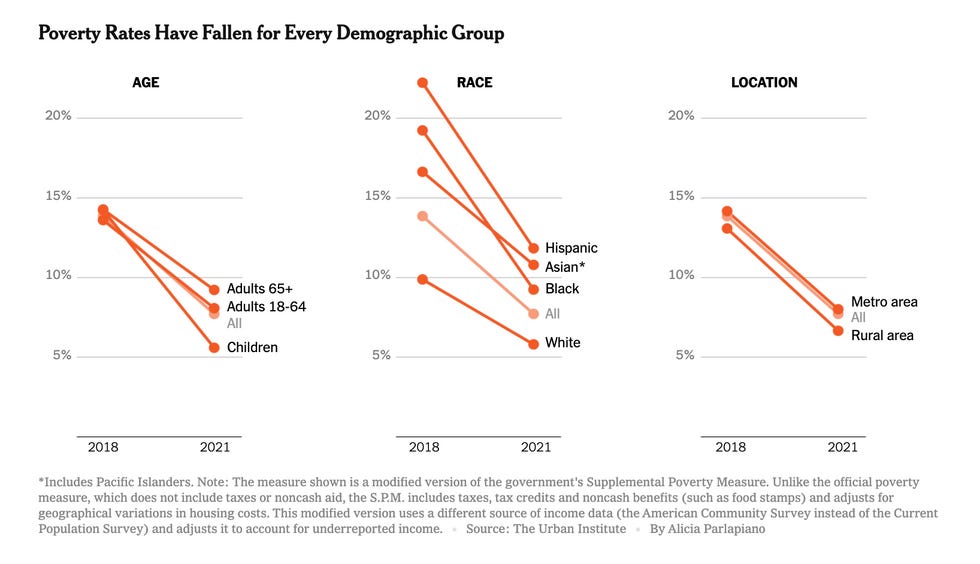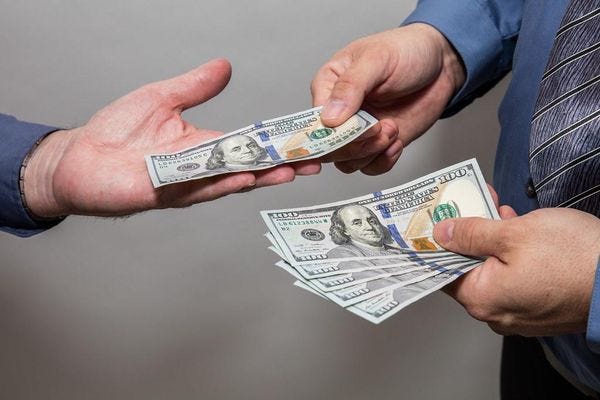COVID Aid Cut Poverty In Half, But America's Gonna America
America: Where everyone but you is a lazy, good for nothing jerk who just wants to buy drugs.
This week, the New York Times published some good news — according to a comprehensive analysis, the money we spent on COVID aid programs cut poverty almost in half, the fastest reduction in all of United States history. The expected poverty rate in 2022 is 7.7 percent, a sharp decline from the estimated 2018 poverty rate of 13.9. This is very, very good news.

Graph showing how poverty rates have fallen for every demographic.
Unfortunately for these families, the programs that did that have already ended or are about to, which may mean that the lift out of poverty was only temporary for many families.
But that doesn't mean we haven't learned some important things from this, about the way things could be if we all just decided that we don't want to live this way anymore. Most of the people receiving assistance were people who had jobs before the pandemic — just jobs that didn't pay them enough to live on. During the pandemic, they were lifted out of poverty simply by getting "paid" enough to live on. Many people used that time to get training and education in order to get better jobs than the ones they went into the pandemic with, jobs that will pay them enough to live on. We also learned that we very much need people to do the jobs that don't pay enough to live on, should we want to keep up the lifestyles to which we have become accustomed.
It seems like we should be able to work something out here, no?
The thing that most flew in the face of traditional American wisdom though is that the program that had the greatest impact on lifting people out of poverty were the stimulus checks. Not targeted assistance, not SNAP, not even unemployment, just plain cash.
The federal stimulus checks have a larger antipoverty impact than any of the other programs; if all other programs were in place but the stimulus checks had not been paid, we project 12.4 million more people would be in poverty in 2021. The Supplemental Nutrition Assistance Program alone keeps 7.9 million people out of poverty in 2021, and unemployment insurance benefits lower the number in poverty by 6.7 million (assuming all other programs are in place).
This is not, actually, new information. Studies have long shown that the most effective and cost-efficient way of lifting people out of poverty is literally just to hand them cash, which is why so many NGOs have refocused their efforts on giving out cash transfers rather than targeted assistance like food. But we live in America, where no one cares what the most effective and cost-efficient thing is in practically any given situation. We're socialized to be suspicious of everyone, because practically anyone other than ourselves is probably a lazy asshole who wants money for nothing and checks for free and who would not be responsible with any of it.
Even two of the people interviewed by the Times, who had themselves been lifted out of poverty by the aid, were concerned about other people taking advantage of it, being lazy and buying the wrong things with the money they were given.
Via New York Times:
To understand how large the recent aid expansion has been, consider the experience of Kathryn Goodwin, a single mother of five in St. Charles, Mo., who managed a group of trailer parks before the pandemic eliminated her $33,000 job.[...]
With increased food stamp benefits and other help, her income grew to $67,000 — almost 30 percent more than when she had a job.
"Without that help, I literally don't know how I would have survived," she said. "We would have been homeless."
Still, Ms. Goodwin, 29, has mixed feelings about large payments with no stipulations.
"In my case, yes, it was very beneficial," she said. But she said that other people she knew bought big TVs and her former boyfriend bought drugs. "All this free money enabled him to be a worse addict than he already was," she said. "Why should taxpayers pay for that?"
Not all "big TVs" are that expensive, and given the fact that people couldn't exactly do a lot of things outside the home and ended up watching a lot of television, it's not actually a stupid thing to spend a little of one's money on. People must have bread, but they must have roses, too.
While it's understandable that she was annoyed with her former boyfriend, it would actually be more expensive for taxpayers to create the kind of "stipulations" that would have prevented someone from spending their money on "drugs." The administrative costs alone would be huge. A far better investment would be providing people with safe ways of getting clean, but God forbid we deal with that in an effective or cost-efficient way either.
Payments also went to people who kept their jobs, which helps explain why "near poverty" fell. The beneficiaries included John Asher of Indianapolis, who once served prison time for selling drugs but is now sober and earning $500 a week as a maintenance man. With $3,200 in stimulus checks, Mr. Asher, 49, was able to leave a boardinghouse, rent an apartment and take custody of an autistic son, who he feared would go to foster care.
But he said he distrusted "the crooked government" and urged poor people to help themselves. "If you want to change your life, you have to get up and do something — not sit home and get free money," he said.
People don't want to sit at home and get free money, but they also don't want to work their asses off and still not make enough to get by — and you know what? A lot of people given the choice between those two things are going to pick the former, because they have families to think about.
Conservative groups like the Heritage Foundation, of course, remain quite sure that the real way to help poor people is by encouraging them to work and get married.
Conservatives say that pandemic-era spending is unsustainable and would harm the poor in the long run, arguing that unconditional aid discourages work and marriage. The child tax credit offers families up to $300 per child a month whether or not parents have jobs, which critics call a return to failed welfare policies.
"There's no doubt that by shoveling trillions of dollars to the poor, you can reduce poverty," said Robert Rector of the Heritage Foundation. "But that's not efficient and it's not good for the poor because it produces social marginalization. You want policies that encourage work and marriage, not undermine it."
Except it literally is very efficient. Studies have shown that when given cash, people use it for largely the same things they use targeted assistance for, just distributed out differently because each person, each family has different needs. Plus it's less expensive.
Via The Atlantic:
Jesse Cunha of the Naval Postgraduate School conducted a randomized trial of cash versus in-kind transfers in rural Mexico. In addition to finding that cash recipients didn't spend more on tobacco or alcohol, Cunha learned that those who received cash experienced the same improvements in nutrition and child-health measures as those who received food. But the food program cost at least 20 percent more to administer, and the cash program led to significantly higher non-food consumption by recipients. In other words: At less cost to the government, cash programs led to the same health outcomes as food-based programs, but also provided additional resources for recipients to spend on schooling, medicine, and transport.
Also, keeping people poor in hopes that it will push them to get married seems like a pretty bad idea that would not lead to any great marriages. Then again, the Heritage Foundation is probably still lamenting the end of shotgun marriages.
The unfortunate thing is that in most scenarios, the most effective and cost-efficient solution is not going to be the most satisfying for those who don't need it. I actually cannot think of any scenario where those interests overlap. But hopefully, every now and again, we take a few lessons and try to move forward in that direction. Or at least not a direction where we're trying to starve people into marriage, because again, that is really fucked up.
Do your Amazon shopping through this link, because reasons .
Wonkette is independent and fully funded by readers like you. Click below to tip us!




(too much of a stretch to use the "Rector? I barely knew her!" joke here but maybe we can build on it)
I thought it was "chicks" for free